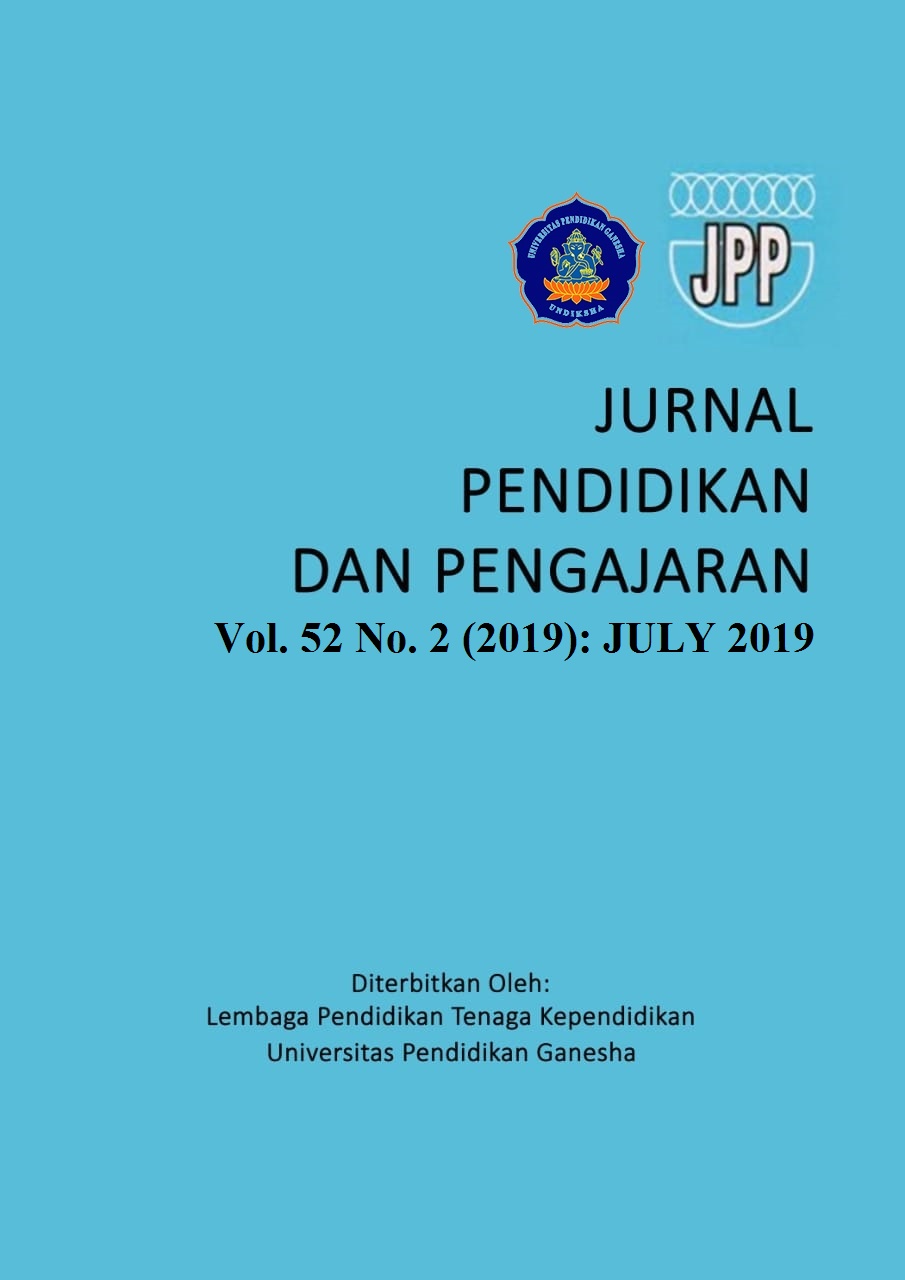Improvement of students’ learning outcome in primary schools using examples non-examples learning model
DOI:
https://doi.org/10.23887/jpp.v52i2.18263Kata Kunci:
learning outcome, examples non-examples, primary schoolAbstrak
This study aims to determine the increase in students’ learning outcomes in primary schools. This type of research is Classroom Action Research (CAR) which refers to the theory of Kemmis and Mc Taggart. PTK uses 4 stages, namely planning, action and observation, and reflection. PTK is carried out through 2 cycles where 3 cycles are held in each cycle. Problem solving solutions with examples non examples learning models. The results of the study were obtained from 27 fifth grade students of SD N Pasekan 03 Ambarawa. Data collection techniques are tests and ratting skills or scale skills. Data analysis is done by statistical statistics or descriptive statistics. Complete pre-cycle learning is 10 students with a percentage reaching 37.04% and those that are not complete there are 17 students with a presentation of 62.96%. Cycle 1 which has reached the completeness limit of 13 students with a percentage of 48.15% and 14 students who have not finished with a percentage of 51.85%. Cycle II the percentage of completeness reached 81.48% with a number of 22 students who had completed and 5 students who had not finished with a percentage of 18.52%. Based on the results of the study, it was found that there was an increase in the learning outcomes of class V students in theme 8 of sub-theme 1 learning 1 and 2 using examples non examples learning models.
Referensi
Anderson, R., Anderson, R., Davis, K. M., Linnell, N., Prince, C., & Razmov, V. (2007, March). Supporting active learning and example based instruction with classroom technology. In ACM SIGCSE Bulletin (Vol. 39, No. 1, pp. 69-73). ACM.
Atkinson, R. K., & Renkl, A. (2007). Interactive Example-Based Learning Environments : Using Interactive Elements to Encourage Effective Processing of Worked Examples Interactive Example-Based Learning Environments : Using Interactive Elements to Encourage Effective Processing of Worked Exam. Educ Psychol Rev, 19, 375–386. https://doi.org/10.1007/s10648-007-9055-2
Dewi, N. N. P., Negara, I. G. A. O., Ke, S. P. M., & Suadnyana, I. N. . (2014). Model Pembelajaran Examples Non-Examples Berbasis Lingkungan Berpengaruh Terhadap Hasil Belajar IPA Siswa Kelas V SD Negeri Gugus Kapten Japa. MIMBAR PGSD Undiksha, 2(1).
Djafar, N. A. (2014). Penerapan Model Pembelajaran Example Non-Example Untuk Meningkatkan Kemampuan Berpikir Kritis Peserta Didik Kelas VIII.K SMP Negeri 4 Sungguminasa Kabupaten Gowa. Jurnal Bionature, 15(2), 67–80.
Gog, T. Van, & Rummel, N. (2010). Example-Based Learning : Integrating Cognitive and Social-Cognitive Research Perspectives. Educ Psychol Rev, 22, 155–174. https://doi.org/10.1007/s10648-010-9134-7
Huda, M. (2013). Model-Model Pengajaran dan Pembelajaran Isu-Isu Metodius dan Paradigmatis. Yogyakarta: Pustaka Belajar.
Lapono, N. d. (2009). Belajar dan Pembelajaran SD. Jakarta: Ditjen Dikti. Depdiknas.
Lestiawan, F., & Johan, A. B. (2018). Penerapan Metode Pembelajaran Example Non-Example untuk Meningkatkan Keaktifan dan Hasil Belajar Dasar-Dasar Pemesinan. Jurnal Taman Vokasi, 6(1), 98–106.
Lusita, A. (2011). Buku Pintar Menjadi Guru Kreatif Inspiratif dan Inovatif. Yogyakarta: Araska.
Mediatati, N. (2017). Meningkatkan Hasil Belajar PPKn Menggunakan Model Pembelajaran Examples Non Examples pada Siswa Kelas VIIIE SMP Negeri 6 Salatiga. Journal of Education Research and Evaluation, 1(2), 100–105.
Mudjiono, D. &. (2013). Belajar & Pembelajaran. Jakarta: Rineka Cipta.
Rusman. (2013). Model-Model Pembelajaran. Jakarta: Rajagrafindo Persada.
Sudjana, N. (2009). Penelitian Hasil Proses Belajar Mengajar. Bandung: PT Ramaja Rosdakarya.
Susanti, R. (2014). Pembelajaran Model Examples Non-Examples Berbantuan Powerpoint Untuk Meningkatkan Hasil Belajar IPA. Jurnal Pendidikan IPA Indonesia, 3(2), 123–127.
Susanto, A. (2013). Teori Belajar dan Pembelajaran di Sekolah Dasar. Jakarta: Prenadamedia Grup.
Trianto. (2010). Mengembangkan Model Pembelajaran Tematik. Jakarta: PT Prestasi Pustaka.
Yensy, N. A. (2012). Penerapan model pembelajaran kooperatif tipe examples non examples dengan menggunakan alat peraga untuk meningkatkan hasil belajar siswa di kelas VIII SMP N 1 Argamakmur. Jurnal Exacta, X(1), 24–35.
Unduhan
Diterbitkan
Cara Mengutip
Terbitan
Bagian
Lisensi
Authors who publish with Jurnal Pendidikan dan Pengajaran agree to the following terms:- Authors retain copyright and grant the journal the right of first publication with the work simultaneously licensed under a Creative Commons Attribution License (CC BY-SA 4.0) that allows others to share the work with an acknowledgment of the work's authorship and initial publication in this journal
- Authors are able to enter into separate, additional contractual arrangements for the non-exclusive distribution of the journal's published version of the work (e.g., post it to an institutional repository or publish it in a book), with an acknowledgment of its initial publication in this journal.
- Authors are permitted and encouraged to post their work online (e.g., in institutional repositories or on their website) prior to and during the submission process, as it can lead to productive exchanges, as well as earlier and greater citation of published work. (See The Effect of Open Access)





